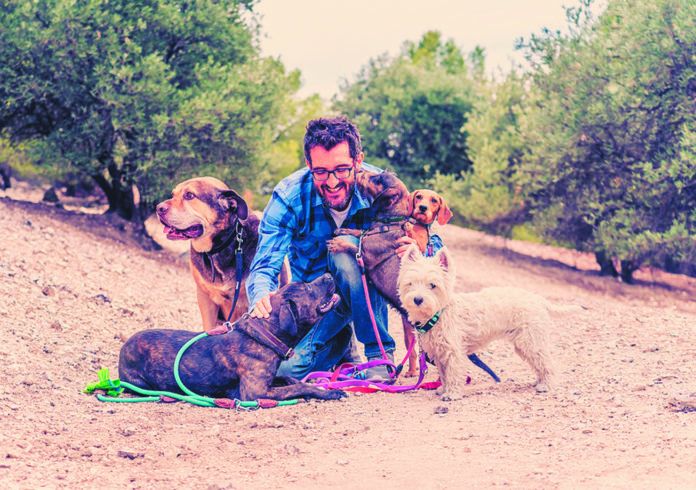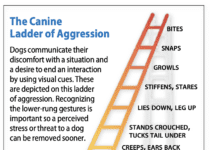How many times have you heard that dogs are pack animals with an alpha as the head, and that if you don’t take the alpha position and dominate them, they will dominate you? People who buy into that concept often treat their dogs harshly in the belief that’s the only way to make sure their pet behaves. It sounds logical. The problem is, it’s not true. Here are the myths that take people down the wrong path — and the science that dispels them.
Myth #1. Dogs are pack animals. Wolves are pack animals. And a pack is just a family unit, with a mother and a father. The rest of the pack members are simply their offspring. Dogs, if left to their own devices, do not live in packs (with the possible exception of Australian dingos). They do develop social ties but do not have linear hierarchies, with different dogs on different rungs of the ladder.
Myth #2. There’s always an alpha dog. Because there is no linear hierarchy among dogs, there is no alpha, or dominant dog. In fact, which dog is “dominant” changes depending on the circumstances. That’s because “dominant” to a dog simply means access to desired resources. For some dogs, dominance is about getting the best sleeping spot. For others, what’s most important is having access to a particular morsel of food. And dogs tend to be very diplomatic about working out which one is “dominant” in which situation. They get a sense of what resource is most important to which dog and generally divvy things up peacefully. (If necessary, they may give a hard stare.)
Myth #3. But a dog who’s aggressive is trying to dominate. Nothing could be further from the truth. In the vast majority of cases, canine aggression is about fear. By acting aggressively, a dog is trying to make a “bad thing” go away — be it another animal or a person. Aggression in a dog could also be about confusion — or physical pain. Dogs use social signaling, that is, body language, to determine who gets what. When they do employ dominance, it’s about avoiding frank aggression; it’s an adaptive strategy for social animals.
Myth #4. We have to show dogs that we are the alpha. Dogs don’t think we’re the head dog, and they don’t see us as pack leader. That’s in part because they don’t live by the notion of packs and alphas (see myths 1 and 2) and in part because they don’t mistake us for dogs. Their unique evolutionary gift, in fact, is that they are primed to be socialized to live with humans. They are not trying to “win.”
Myth #5. If you don’t dominate your dog, your dog will dominate you. Dogs are opportunists, for sure. They will take advantage of a situation if they are not taught otherwise — like begging for food at the table if it gets them what they want. But they have no interest in dominating, even when they’re being pushy; they’re not aiming to rule the roost.
So what is our relationship with our dogs?
If dogs are not pack animals and, in addition, if we are not the alphas and they are not trying to dominate us but are willing to take advantage of a situation, does that mean we are equals?
“Dogs and people are not equals,” says Tufts animal behaviorist Stephanie Borns-Weil, DVM, “just as adults and children are not equals. But not being equal doesn’t mean dogs need us to dominate them. It means they need us to be clear about our expectations. That’s a different approach. It’s not ‘Do it because I say so.’ It’s ‘Do it because if you get off the couch, you get a piece of food. You do it voluntarily, and I reward the behavior in a predictable way.’ Dominance, on the other hand, has an ‘or else’ attached to it,” Dr. Borns-Weil says. “That’s worse than not necessary. It’s counter-productive.
“It’s similar to the American Pediatric Association’s recommendations for disciplining children,” Dr. Borns-Weil says. “Discipline no longer means spanking. It means setting up your child for success by rewarding them when they do succeed and teaching them strategies for not getting into trouble.”
Dominance as a way of teaching dogs to behave is what Dr. Borns-Weil calls a zombie idea. “It has died with the research but keeps popping up in new forms. It’s time to move on,” she says. “Getting a dog to comply is about increasing his happiness because he cooperates. It doesn’t mean a behavioral shutdown based simply on following orders.”






Exactly! The whole alpha dog concept just won’t go away, trainers keep using dominance theory is if a dog is a wolf. People like the idea of being the leader, the strong leader of the pack, even if it’s based in myth. Ignorance can feel like intelligence if someone doesn’t know the difference.
BAD trainers use the dominance theory. Since there is no such thing, I question calling them “trainers”. It is merely an excuse to be abusive.
You are right, that, no matter the subject, if it SOUNDS good, people repeating things that are not true think they are intelligent. It is astounding how many subjects fall under that category (untrue, harmful, arrogant) without anyone FACT-CHECKING.
I still repeat the myth of alpha and packs but most people do not accept it.